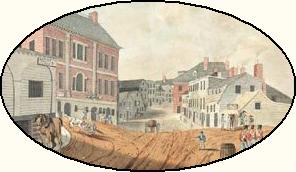Spadina Literary Review — edition 5 page 09
.../
That shipwreck, or something in those missing months, was pivotal for Oliver. Life took a new turn. Drawing a boost from his famous name, our Oliver Goldsmith began to ingratiate himself in Haligonian society, making friends in the Tory circle that ran the colony. He joined the Halifax garrison amateur theatre, where the organizers (officers’ wives) cast Oliver (a natural!) in his grand-uncle’s ever-popular comedy of errors, She Stoops to Conquer. Oliver played the role of Tony Lumpkin, a boozy, young schemer pulling out all the stops to avoid an arranged marriage to his cousin Constance. (He prefers some off-stage wench named Bet Bouncer.) Minutes before the final curtain, Tony calls upon all present to witness his pledge that he will not take Constance for his true and lawful wife — a sassy reversal of convention that would have the audience rollicking for a few moments before settling for the de rigueur happy ending that pairs Constance with Hastings, her true beloved.
It was during this part of his life that Oliver entered, in his phrase, “the Regions of Poetry.”

Lower Water Street, Halifax, 1823
(British army watercolor)
Oliver composed “The Rising Village,” his 582-line magnum opus, at the urging of his Tory buddies in Halifax. It was a clever idea. A different long poem, “The Deserted Village,” written by Oliver’s grand-uncle two generations previous, had remained a thorn in the colonial marketing side: it depicted an English countryside gone to ruin since the nouveaux riches, flush with lucre from the Empire, made room in the countryside for their mansions and hounds by booting out the country folk, whose sole recourse was to ship out for the New World — which Dr. Goldsmith portrays as a bleak, infested wilderness one step from Hades. The Halifax solution, then, was that our Oliver Goldsmith should pen a ‘sequel’ showing the English refugees turning Acadia into a glowing success story under British imperial rule. What a concept! (The term “Acadia,” incidentally, still embraced the two colonies, New Brunswick and Nova Scotia, altho Oliver and probably his audience suffered amnesia about the deported original French Acadians.) Finally, to maximize his poem’s career-boosting potential, Oliver tossed in several lines of praise for Lord Dalhousie, the brass hat for all British North America at the time.
The pioneers fell the trees, erect their huts, and sow the fields. Golden corn replaces untamed forest — thus "The Rising Village" dispenses with Dr. Goldsmith’s overstated wilderness issue. Chasing off the “savage tribes,” the pioneers build a village, with such accoutrements of civilization as a church and a schoolhouse. Yet look how readily the newest generation reverts to “thoughtless pleasures” — doing what comes naturally. If only Virtue could compel obedience, says Oliver, then parents needn’t fret over their children’s misdeeds:
Nor could my verse the hapless story tell
Of one poor maid who loved — and loved too well.
That’s the kludge that ushers in the Albert-and-Flora sequence. Their names are not mentioned before or after this sequence.